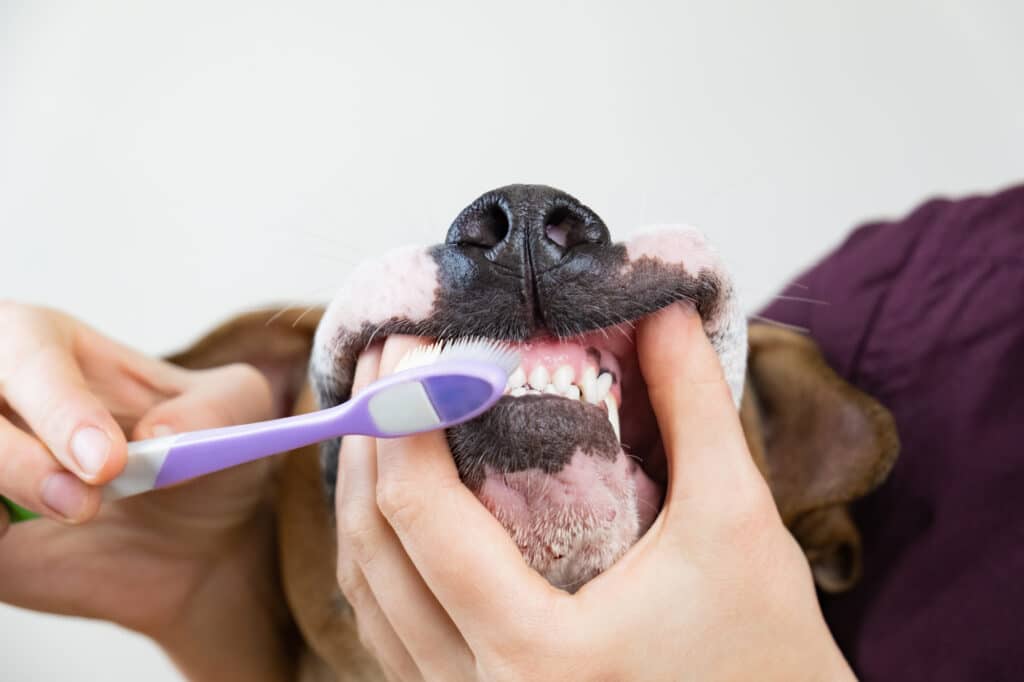
As a responsible dog owner, it’s important to prioritize your dog’s oral health. Just like humans, dogs can also suffer from dental problems, which can lead to pain, infection, and even organ damage if left untreated. To ensure your pet friend has a healthy mouth, you should establish a dental care routine and monitor their dental health regularly. Let’s discuss the importance of dog dental care and provide you with tips on how to properly manage your dog’s oral health.
The Importance of Dog Dental Care
Maintaining your dog’s oral health is crucial to their overall well-being. Poor oral hygiene can lead to various dental problems, such as tartar buildup, gum disease, tooth decay, and tooth loss. These dental problems can cause pain and uneasiness for your dog, making it difficult for them to eat and enjoy their food. In severe cases, dental diseases can even affect other organs, including the heart, liver, and kidneys.
Regular dental care can prevent these issues from occurring and help identify any problems in their early stages. By taking care of your furry friend’s teeth and gums, you can improve their overall quality of life and reduces the risk of pricey and painful dental procedures in the future.
Tips for Managing Your Dog’s Oral Health
1. Regular Brushing:
Just like humans, dogs need regular brushing to remove plaque and prevent tartar buildup. Use a toothbrush and toothpaste that’s exactly designed for dogs, as human toothpaste can be dangerous to your pet. Start slowly and little by little introduce your dog to the toothbrush by letting them lick the toothpaste off the brush. Once they are comfortable, gently brush their teeth using circular motions. Aim to brush your dog’s teeth at least two to three times a week.
2. Dental Chews and Toys:
Using dental chews and toys can be a great way to supplement your dog’s oral care routine. Look for products that are specifically designed to promote dental health, such as those that help remove plaque and tartar. Avoid toys or chews that are too hard or small, as they can pose a choking hazard to your dog.
3. Dental Diet:
Feeding your dog a dental diet can also help maintain their oral health. These specially formulated foods are designed to scuff plaque away and tartar as your dog chews, reducing the risk of dental problems. Consult with your veterinarian to find the best dental diet for your dog’s specific needs.
4. Regular Dental Check-ups:
Just like humans, dogs also need regular dental check-ups with a veterinarian. During these visits, a thorough examination of your dog’s teeth and gums will be conducted. The vet may also recommend a professional dental cleaning if necessary. Regular check-ups can help identify any dental problems early on and ensure your dog’s oral health is maintained.
5. Be Aware of Dental Problems:
As a dog owner, it’s important to be aware of common signs and symptoms of dental issues. Some common signs include bad breath, swollen or bleeding gums, difficulty eating or chewing, excessive drooling, loose or missing teeth, and pawing at the mouth. If you notice any of these signs, it’s crucial to seek consult with your veterinarian for a proper diagnosis and treatment.
6. Provide Fresh Water:
Ensure that your dog always has access to fresh, clean water. Water helps keep your dog’s mouth hydrated and can rinse away food particles and bacteria. Regularly changing your dog’s water will prevent bacterial growth and promote good oral health.
7. Avoid Certain Foods:
Some human foods can be harmful to your dog’s dental health. Sticky or sugary foods, as well as hard bones and objects, can cause dental damage. Avoid feeding your dog foods that can easily get stuck in their teeth, as they can contribute to plaque buildup and tooth decay.
8. Start Early:
Introducing your dog to dental care at a young age is essential. Starting a dental routine early on will acclimate them to the process and make it easier for both you and your dog. Puppies should have their teeth examined by a veterinarian, and the dental care routine should be gradually introduced as they grow.
Read: The Importance of Pet Grooming
In conclusion, maintaining your dog’s oral health is essential for their overall well-being. By following these tips and establishing a dental care routine, you can ensure your furry friend has a healthy mouth and prevent potential dental problems. Remember to seek consult with your veterinarian for guidance on specific dental products and treatments for your dog. A healthy smile equals a happy and healthy dog.



